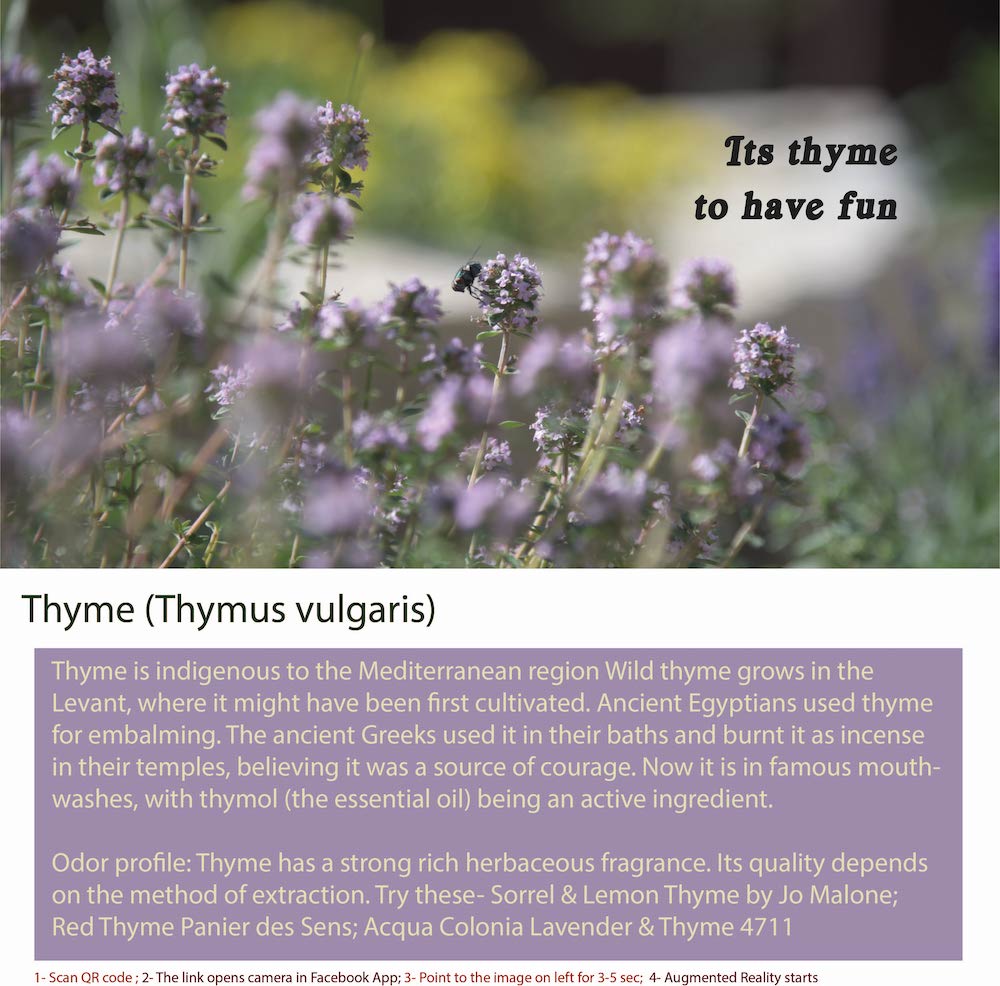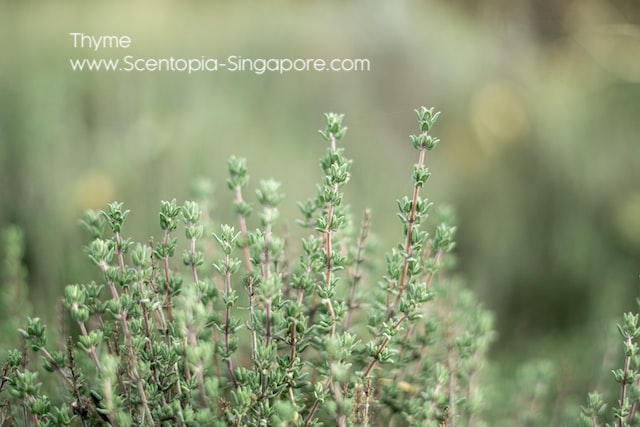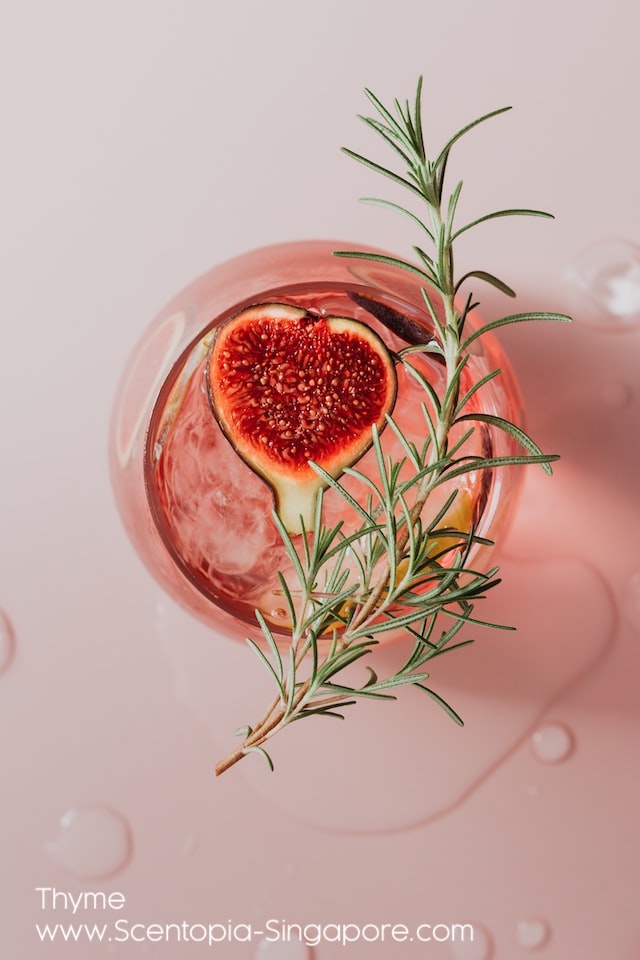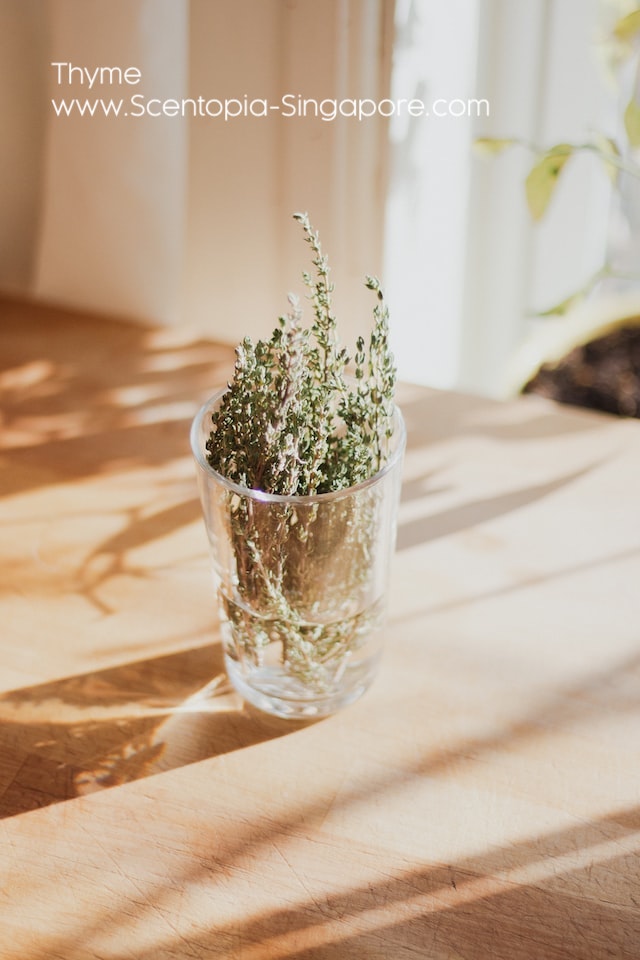Unveiling Thyme: A Captivating Fresh Oriental Fragrance
Thyme: The Aromatic Herb of Culinary Delights, Therapeutic Oils, and Fascinating Facts
Introduction: Thyme, with its delightful aroma and versatile uses, is an aromatic herb celebrated for its presence in perfumes, therapeutic oils, culinary creations, and traditional medicine. Scientifically known as Thymus vulgaris, thyme is a perennial herb belonging to the Lamiaceae family. This herb has been cherished by various cultures for centuries for its culinary excellence, healing properties, and aromatic allure. From inspiring perfumers with its herbal fragrance to offering potential health benefits in therapeutic oils and traditional medicine, thyme is more than just an herb. This essay delves into the captivating world of thyme, encompassing its presence in perfumes, therapeutic oils, food, medicinal systems, historical significance, and intriguing fun facts about this extraordinary and cherished herb.
The Aroma of Thyme: Thyme is renowned for its delightful herbal aroma, which is both earthy and slightly floral. Its fragrance adds depth to perfumes and enhances the therapeutic properties of the oil.
Perfumes and Fragrance: Thyme's herbal fragrance has inspired perfumers to create scents that capture the essence of this delightful herb. While not a primary fragrance note, its inclusion in some perfumes offers a unique and fresh twist.
Therapeutic Oils and Aromatherapy: Thyme essential oil is used in aromatherapy for its potential benefits. Its aroma is believed to promote a sense of relaxation, mental clarity, and emotional balance. Additionally, it is valued for its potential antimicrobial and anti-inflammatory properties.
Culinary Delights: Thyme is a versatile herb used in various culinary creations. It pairs well with meats, vegetables, soups, and stews, adding a delightful herbal flavor to dishes.
Medicinal Applications: Thyme has a long history of use in traditional medicine systems. It is believed to have potential benefits for respiratory health, digestion, and immune support. Thyme herbal teas and tinctures are used for their potential health properties.
Historical Significance: Thyme has a rich history that dates back to ancient Egypt and Greece, where it was used for culinary and medicinal purposes. It was also a symbol of courage and bravery in ancient Rome.
Fun and Crazy Facts:
Thyme, with its aromatic allure and potential wellness benefits, is a cherished and versatile herb that continues to captivate and inspire with its herbal fragrance and culinary excellence. From its presence in perfumes to its uses in aromatherapy and traditional medicine, thyme offers a wealth of enjoyment and potential health benefits. As we savor the delightful aroma and explore its cultural significance and historical uses, we are reminded of the enduring appeal and natural charm of this extraordinary herb that has enriched our culinary traditions, perfumery, and healing practices with its unique fragrance and therapeutic potential.
Introduction: Thyme, with its delightful aroma and versatile uses, is an aromatic herb celebrated for its presence in perfumes, therapeutic oils, culinary creations, and traditional medicine. Scientifically known as Thymus vulgaris, thyme is a perennial herb belonging to the Lamiaceae family. This herb has been cherished by various cultures for centuries for its culinary excellence, healing properties, and aromatic allure. From inspiring perfumers with its herbal fragrance to offering potential health benefits in therapeutic oils and traditional medicine, thyme is more than just an herb. This essay delves into the captivating world of thyme, encompassing its presence in perfumes, therapeutic oils, food, medicinal systems, historical significance, and intriguing fun facts about this extraordinary and cherished herb.
The Aroma of Thyme: Thyme is renowned for its delightful herbal aroma, which is both earthy and slightly floral. Its fragrance adds depth to perfumes and enhances the therapeutic properties of the oil.
Perfumes and Fragrance: Thyme's herbal fragrance has inspired perfumers to create scents that capture the essence of this delightful herb. While not a primary fragrance note, its inclusion in some perfumes offers a unique and fresh twist.
Therapeutic Oils and Aromatherapy: Thyme essential oil is used in aromatherapy for its potential benefits. Its aroma is believed to promote a sense of relaxation, mental clarity, and emotional balance. Additionally, it is valued for its potential antimicrobial and anti-inflammatory properties.
Culinary Delights: Thyme is a versatile herb used in various culinary creations. It pairs well with meats, vegetables, soups, and stews, adding a delightful herbal flavor to dishes.
Medicinal Applications: Thyme has a long history of use in traditional medicine systems. It is believed to have potential benefits for respiratory health, digestion, and immune support. Thyme herbal teas and tinctures are used for their potential health properties.
Historical Significance: Thyme has a rich history that dates back to ancient Egypt and Greece, where it was used for culinary and medicinal purposes. It was also a symbol of courage and bravery in ancient Rome.
Fun and Crazy Facts:
- Thyme in Ancient Rituals: In ancient Egypt, thyme was used in embalming practices due to its aromatic and antimicrobial properties.
- Thyme for Preservation: In the Middle Ages, thyme was used as a natural preservative to protect against spoilage and bacteria.
- Thyme Varieties: There are various thyme varieties, including common thyme, lemon thyme, and caraway thyme, each with subtle differences in flavor and aroma.
- Bee Attraction: Thyme flowers are attractive to bees and other pollinators, making it a valuable addition to gardens.
- Thyme's Ancient Name: The name "thyme" is derived from the Greek word "thumos," which means "courage" or "fumigate."
Thyme, with its aromatic allure and potential wellness benefits, is a cherished and versatile herb that continues to captivate and inspire with its herbal fragrance and culinary excellence. From its presence in perfumes to its uses in aromatherapy and traditional medicine, thyme offers a wealth of enjoyment and potential health benefits. As we savor the delightful aroma and explore its cultural significance and historical uses, we are reminded of the enduring appeal and natural charm of this extraordinary herb that has enriched our culinary traditions, perfumery, and healing practices with its unique fragrance and therapeutic potential.
To experience augmented reality, please open the Facebook-app using QR code and point to the image below
Crafted with Excellence: Thyme Fragrance at Scentopia Singapore
Thyme is a fragrant, perennial herb that is widely used in cooking and in traditional medicine. It is native to the Mediterranean region and is a member of the mint family. The leaves of thyme have a distinct, pungent aroma and a warm, slightly bitter taste that makes it a popular ingredient in many dishes, including soups, stews, sauces, and marinades.
Thyme has a long history of use in traditional medicine, and its essential oil has been used for its antiseptic, anti-inflammatory, and expectorant properties. Thyme oil has also been used to treat respiratory problems, skin conditions, and digestive issues.
In aromatherapy, thyme essential oil is often used for its energizing and uplifting scent, which is said to help relieve stress and promote mental clarity. The oil is also used to help stimulate the immune system, soothe sore muscles and joints, and support respiratory health.
Thyme is also used as a decorative herb in gardens, where it can be used to create borders and as a low-growing ground cover.
Thyme has a long history of use in traditional medicine, and its essential oil has been used for its antiseptic, anti-inflammatory, and expectorant properties. Thyme oil has also been used to treat respiratory problems, skin conditions, and digestive issues.
In aromatherapy, thyme essential oil is often used for its energizing and uplifting scent, which is said to help relieve stress and promote mental clarity. The oil is also used to help stimulate the immune system, soothe sore muscles and joints, and support respiratory health.
Thyme is also used as a decorative herb in gardens, where it can be used to create borders and as a low-growing ground cover.
Explore Our Exclusive Unisex Perfume Collection
Thyme is widely available in Singapore and is used in cooking, medicine, and ornamental gardening. As a popular culinary herb, thyme is used in many dishes, including soups, stews, sauces, and marinades, to add flavor and aroma.
In traditional medicine, thyme is used for its antiseptic, anti-inflammatory, and expectorant properties. Thyme oil is sometimes used to treat respiratory problems, skin conditions, and digestive issues.
Thyme is also a popular ornamental herb and is often grown in gardens as a low-growing ground cover or used to create borders. The herb is prized for its fragrant leaves and small, delicate flowers, which attract pollinators and other beneficial insects to the garden.
Thyme essential oil and dried thyme leaves are readily available in many health food stores and herbal shops in Singapore, and the herb is widely used in cooking and traditional medicine.
In traditional medicine, thyme is used for its antiseptic, anti-inflammatory, and expectorant properties. Thyme oil is sometimes used to treat respiratory problems, skin conditions, and digestive issues.
Thyme is also a popular ornamental herb and is often grown in gardens as a low-growing ground cover or used to create borders. The herb is prized for its fragrant leaves and small, delicate flowers, which attract pollinators and other beneficial insects to the garden.
Thyme essential oil and dried thyme leaves are readily available in many health food stores and herbal shops in Singapore, and the herb is widely used in cooking and traditional medicine.
Thyme Fragrance: A Symphony of Fresh Oriental Notes
Thyme has a warm, earthy, and slightly spicy scent with notes of camphor and a hint of mint. Thyme's scent is composed of various volatile essential oils, including:
- Thymol
- Carvacrol
- Pinene
- Cymene
- Terpinene
- Borneol
- Linalool
- Caryophyllene
- Geraniol
- Limonene.
Unisex Scent Thyme: Where Tradition Meets Aromatic Innovation
Thyme is used as a fragrance ingredient in various perfumes, particularly in:
- Herbal and earthy scents
- Aromatic and spicy fragrances
- masculine colognes
- Chypre and Fougere perfumes
- Clean and fresh fragrances.
- Le Labo
- Diptyque
- Tom Ford
- Jo Malone
- L'Artisan Parfumeur.
Experience Luxury at Its Finest with Scentopia Singapore
Thyme is used in cosmetics for its various benefits, including:
Thyme is commonly found in:
Brands that use thyme in their cosmetics include:
- Antimicrobial properties, making it useful in skin and personal care products
- Antioxidant properties, helping to protect skin from damage
- Anti-inflammatory properties, useful in treating skin conditions such as acne and eczema
- Stimulating effect, promoting circulation and helping to tighten and firm skin.
Thyme is commonly found in:
- Face wash and cleansers
- Moisturizers and creams
- Toners and astringents
- Shampoo and hair care products
- Soaps and shower gels.
Brands that use thyme in their cosmetics include:
- L'OCCITANE
- Kiehl's
- The Body Shop
- Origins
- Aveda.
Join Scentopia, Sentosa's latest tourist attraction wonderful orchid scent crafting, fragrance tour, bridal shower or corporate team building which includes perfume making onsite and offsite, beach activities and more. We also serve primary school learning journey, secondary students and pupil on industrial excursions. Know more about our orchids perfume bar or therapeutic orchid scents and other wellness aromas. Conatct Perfume workshop or book a scent crafting session here.






